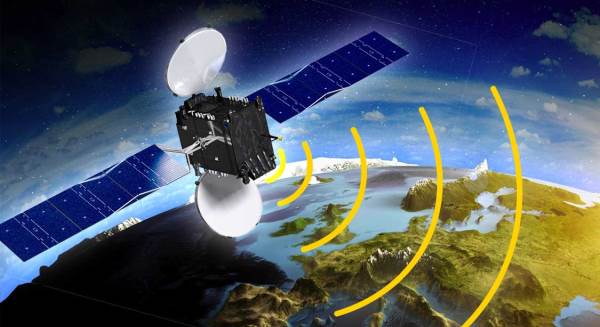Telecom
Satellite Technology Capable of Saving African Governments Billions

African governments and private sector organisations could save billions of dollars by adequately leveraging satellite networks and next-gen satellite technology for more effective disaster management efforts.

This is one of the key findings of “The Role of Satellite Communications in Disaster Management” white paper, released by Access Partnership, a global public policy firm for the technology sector.
The white paper outlines the urgency with which governments and the private sector need to leverage satellite technology for more effective disaster management efforts in Africa and globally.
If governments increase investments in physical and social infrastructure through the acceleration of transformational technologies, such as the effective use of satellite networks and next-generation satellite technology, this has the power to provide crucial data prior to, or when a natural disaster strikes, it says.
Satellite networks can also significantly reduce costs during emergencies, particularly where cellular networks cannot reach.
According to the report, the annual number of natural disasters is set to increase by 37% (from 442 to 541 occurrences) by 2025 globally. The impact of natural disasters is expected to be concentrated among low- and middle-income countries, which are relatively less prepared to adapt.
It shows that natural disasters currently cost the agricultural sectors of these markets more than $108 billion in damaged crop and livestock production.
Should the level of financing in climate adaptability remain low in these markets, the United Nations Environment Programme estimates climate change adaptation and natural disaster damages could cost developing countries $280 billion to $500 billion per year by 2050.
Because satellites are positioned above the earth’s atmosphere, they are able to produce crucial data on vast geographical situations and enable adequate disaster planning measures, which can save lives and reduce costs.
“Putting in place satellite services and next-generation satellite-enabled connectivity can mean the difference between saving millions of lives, or losing them,” says Ivan Suarez, senior policy manager at Access Partnership.
“As shown by this study, we need a concerted effort to fix the underlying inefficiencies of our existing communication systems. The availability of communication networks is directly related to the ability to respond quickly to emergencies and this move can also reduce government expenditure during and post-disaster.”
Satellite provides connectivity and broadcast services over vast geographical areas. It also offers extreme high-availability, which is not impacted by on-the-ground conditions, such as load-shedding.
With new entrants like SpaceX’s Starlink satellite service setting its sights on the African continent, there’s been a lot of buzz surrounding the satellite industry recently.
Important predictions
According to the research, weather-related disasters − such as hurricanes, tropical storms, floods, wildfires, tornadoes and severe storms − are likely to become more frequent and widespread in coming years, due to climate change.
This increased frequency of natural disasters, predominantly caused by climate change, is set to overwhelm the National Emergency Telecommunications Plans (guideline document by the International Telecommunication Union) and terrestrial service providers currently in place to minimise and mitigate the human and economic cost of adverse weather events.
Satellite data, combined with the use of data analytics and predictive technologies, such as artificial intelligence, can be used to analyse past behaviour and provide a forecast on future weather patterns, it notes.
“In order to combat the user knowledge limitations faced by our present satellite solutions and their application in emergency response, a revolution is needed, and satellite-enabled technology is at the core of it.
“The landscape of each jurisdiction may define the best deployment alternatives for a given country. However, the need for complementary satellite-enabled connectivity is a must for even highly-connected telecommunications markets, which also have under-served areas.”
The report highlights that more agile regulatory and policy guidelines for the fast deployment of emergency communications technology are required in Africa.
“The role of policy and regulation is key to guarantee responses are both effective and timely. For this, defining the institutional roles that are applicable during disaster and emergency management is of paramount importance.
“Licensing and authorisation frameworks need to seriously consider the human and economic importance of enabling complementary satellite-enabled connectivity in future years,” it states.
Telecom
US Bans Use of WhatsApp on Official Devices over Security Concerns

United States (US) House of Representatives has banned WhatsApp from all official devices as a result of data privacy and security concerns.

Harry Coker, acting national cyber security (ONCD) Director confirmed this via a statement issued on Monday, June 23 stating that WhatsApp’s high risk classification is attributed to the messaging app’s ambiguous data protection policies, inadequate encryption for stored data, and other potential security vulnerabilities.
He stated that staff have since been advised to utilize more secure communication platforms, with recommended alternatives including Microsoft Teams, Apple’s iMessage and FaceTime, Signal, and Amazon’s Wickr.
However, Nick Clegg, president of Global Affairs for Meta, WhatsApp’s parent company, has strongly opposed the ban.
He said, “We disagree with this decision in the strongest possible terms, whatsApp provides a higher level of security than the other approved apps.”
This ban on WhatsApp is not an isolated incident, it follows previous restrictions on other applications, such as TikTok, which was removed from government devices in 2022.
The decision also comes just months after WhatsApp itself confirmed that Israeli spyware firm Paragon Solutions had targeted some of its users, including journalists and civil society figures.
Telecom
MTN Nigeria Receives UN Women Award for Empowering Women Nationwide

MTN Foundation has received accolades from UN Women, the United Nations entity dedicated to gender equality and the empowerment of women.

The recognition, presented during a profile courtesy visit by UN Women representatives to MTN Nigeria’s Head Office in Ikoyi, Lagos, acknowledged the Organisation’s profound contributions to advancing women’s empowerment across the nation.
The UN Women delegation, led by Beatrice Eyong, UN Women Country Representative to Nigeria, commended MTN and its Foundation for their unwavering commitment to fostering an inclusive society where women thrive.
During the presentation, Beatrice Eyong, UN Women Country Representative to Nigeria, expressed profound admiration for MTN’s efforts. “I want to congratulate MTN for all that they have been doing,” Eyong stated, her voice resonating with appreciation. “And I want to congratulate MTN Foundation specifically, because they are leaving things better than they met them especially with their Mother and Child Initiatives.” Her remarks highlighted MTN’s focused impact, suggesting a significant improvement in the landscape of women’s empowerment due to the company’s interventions.
Odunayo Sanya, Executive Director of the MTN Foundation, received the award and further elaborated on the company’s broader commitment to societal upliftment through women’s empowerment. ” Our Y’ellopreneur program targeted at Female entrepreneurs is about creating access for our Female Entrepreneurs – access to skills, capital and markets. Our commitment is to contribute to the success of women – led businesses in Nigeria.
This focus on economic empowerment through skills development directly benefits women seeking to improve their livelihoods. This recognition comes as MTN Nigeria continues to champion various programmes aimed at uplifting women, from promoting gender diversity within its corporate structure to supporting women-led businesses and initiatives.
The company’s alignment with global best practices, including its recent signing on to the United Nations Women Empowerment Principles (WEPs), further solidifies its position as a leader in corporate social responsibility and gender equality advocacy.
The award serves as a testament to MTN Nigeria’s strategic and impactful investments in creating a more equitable future for Nigerian women.
Telecom
15 African Startups Using AI Selected for Google Accelerator Cohort 9

Google today announced the selection of 15 promising tech startups for its Google for Startups Accelerator: Africa Class 9 program. These innovative startups, hailing from Ghana, Ethiopia, Kenya, Nigeria, Rwanda, Senegal, and South Africa, are leveraging artificial intelligence (AI) to address significant challenges across diverse sectors, including fintech, agritech, healthtech, and professional services.

In an era where startups are at the forefront of solving critical challenges across Africa, these innovators often face significant hurdles to scale their operations, particularly in securing essential support, mentorship, and funding. Programs like the Google for Startups Accelerator: Africa play a crucial role in providing these opportunities, enabling tech founders and innovators to amplify their impact. By bringing together Google’s extensive resources, including cutting-edge AI technologies and a global network of experts, the program aims to equip these startups to not only thrive but also lead in addressing both local and global challenges in this AI era.
The selection follows a highly competitive application process that began in April 2025 , drawing nearly 1,500 applications from across the continent. This cohort underscores Google’s deep commitment to fostering Africa’s vibrant tech ecosystem and supporting startups in their growth journey.
“African startups are at the forefront of solving critical challenges across the continent, and their work with AI is truly transformative,” said Folarin Aiyegbusi, Head of Startup Ecosystem, Africa at Google. “This program reflects our belief that AI can be transformative when shaped by those who understand the context deeply. We are incredibly excited to support these founders who are building for impact and helping to shape an inclusive AI ecosystem across Africa.”
Over the next three months, the selected startups will participate in a hybrid accelerator program (June 23rd to August 22nd, 2025). Participants will receive dedicated technical mentorship from experienced Google engineers and industry experts , up to $350,000 in Google Cloud credits , and strategic support in AI implementation, product leadership, and business growth. They will also gain access to a global network of investors, partners, and collaborators, amplifying their reach and impact.
Since its inception in 2018, the Google for Startups Accelerator Africa program has supported 153 startups from 17 African countries. Collectively, these alumni have raised over $300 million in funding and created more than 3,500 jobs. Google has directly contributed $5 million through a combination of equity-free funding and product credits to support these founders.
The Google for Startups Accelerator: Africa Class 9 cohort includes:
AFRIKABAL (Rwanda): A blockchain and AI-powered platform helping farmers, buyers, and logistics firms trade crops securely and transparently.
Apexloads (Kenya): A logistics SaaS platform helping African freight brokers, forwarders, and transporters move cargo faster with verified partners.
E-doc Online (Nigeria): Simplifies compliance and credit checks by analyzing real-time banking data, enabling faster onboarding and smarter lending decisions.
GoNomad (Nigeria): Enables businesses to start and run global entities, and solopreneurs to professionally invoice and get paid globally like a local.
Midddleman (Nigeria): An intelligent sourcing and payment platform helping African businesses import and pay for goods from China faster, safer, and cheaper.
Myltura (Nigeria): An AI-powered digital health platform enabling remote care, test access, and seamless health data management in Africa.
Pastel (Nigeria): Offers Enterprise AI solutions, inc. AI based fraud detection and anti-money laundering solutions to financial institutions in Africa.
Rapid Human AI (South Africa): An end-to-end AI design-thinking platform that turns ideas into code in days, cutting development time by 80%.
Regulon (Ghana): An AI-powered compliance and onboarding platform designed to simplify regulatory processes for businesses across Africa and the EMEA region.
Scandium (Nigeria): An AI Quality Assurance suite that helps teams ship bug-free software faster with end-to-end test automation and test ops tooling.
Shamba Records (Kenya): An AI-powered platform that empowers 50,000+ African farmers with smart credit, market access, and climate-resilient, data-driven agriculture.
Smartel Agri Tech (Rwanda): Helps smallholder farmers in the Global South get ahead of crop pests and diseases early using AI-powered, solar-driven devices and SMS alerts.
TOLBI (Senegal): Leverages AI and satellite imagery to empower sustainable agriculture across Africa, providing precise crop yield forecasts.
YeneHealth (Ethiopia): An AI-driven digital health web, and mobile app streamlining access to affordable, reliable, quality medications & health care services.
Zerone Analytiqs (Ghana): A transformative two-pronged solution to the data scarcity in Africa, We are revolutionizing how data is sourced, analyzed, and utilized for decisions.
For further information and updates, visit the Google Africa Blog or follow @GoogleAfrica on social media.

 Telecom3 days ago
Telecom3 days agoLebara, New Operator Enters Nigerian Telecom Arena, Sells Minutes, Not Airtime

 General News2 days ago
General News2 days agoOpenAI Unveils New AI Agent for Software Developers

 E-Business3 days ago
E-Business3 days agoOver 7m Streaming Accounts’ Credentials were Leaked in 2024 – Report

 E-Financial3 days ago
E-Financial3 days agoFidelity Bank Uplifts Old People’s Home with Essential Items Donation

 E-Financial3 days ago
E-Financial3 days agoS&P Global Ratings Downgrades Ecobank Nigeria’s Credit Rating to CCC-, Outlook Negative

 Telecom3 days ago
Telecom3 days agoPIN Pushes for Equitable Digital Governance at World Internet Forum

 Telecom2 days ago
Telecom2 days ago15 African Startups Using AI Selected for Google Accelerator Cohort 9

 E-Financial3 days ago
E-Financial3 days agoEFCC Drags Cititrust to Court over Unreported ₦200mTransfers















